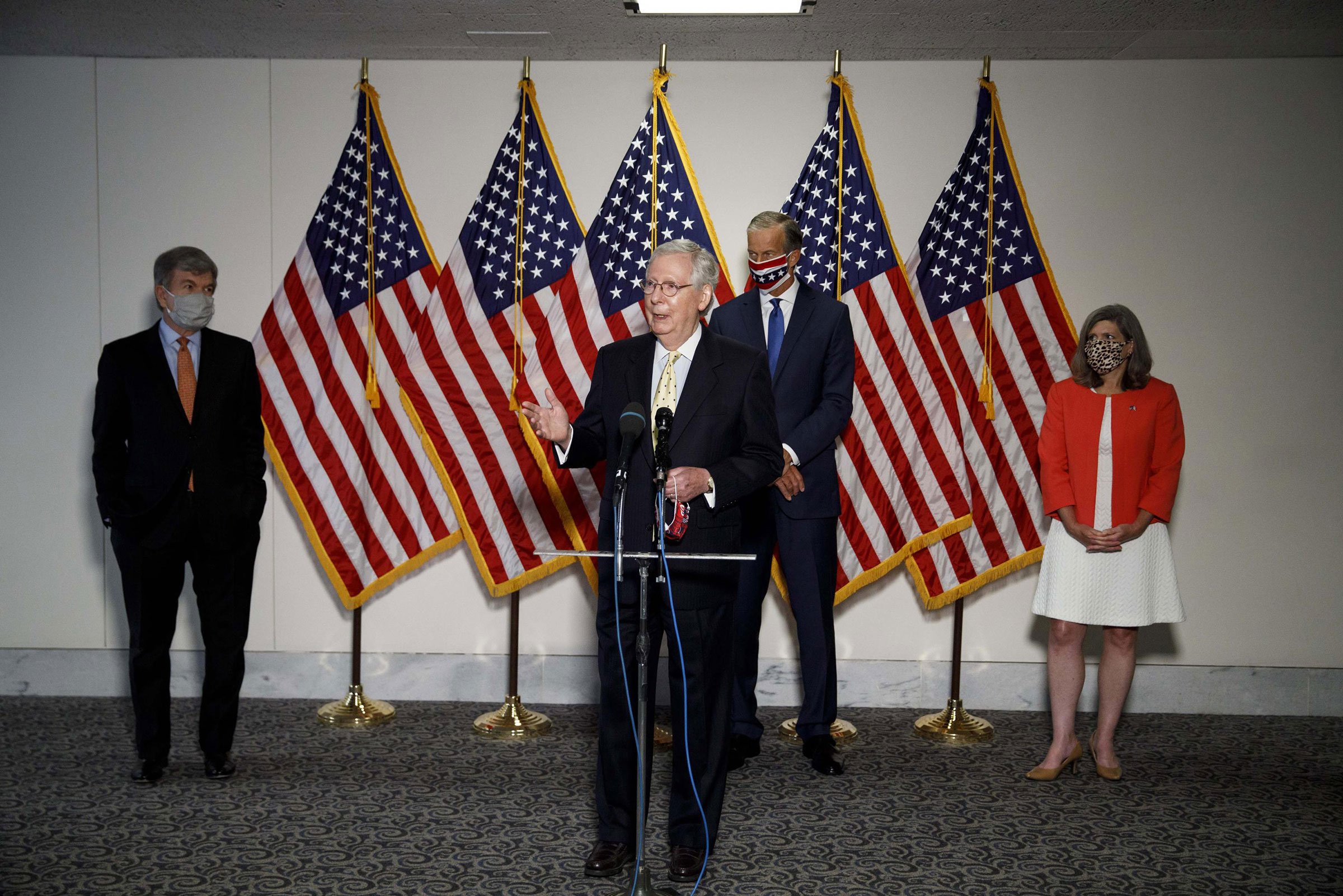
There’s a whiff of bad improv in Washington right now as White House officials, their allies across government and fellow Republicans who control the Senate seem to be vamping their way to a trillion-dollar package that is more press release than real relief for a pandemic-struck nation. After days of delay, hours of conference calls and plenty of tense weekend meetings in the ornate suites at the Capitol, it appears that the Senate’s Republican majority is ready to serve up its opening offer to replace a coronavirus relief package that expires at the end of this week.
The moment represents one of the worst patterns in contemporary Washington as the nation confronts not just a pandemic and an economic crisis but also a reckoning on racial injustice. Republicans and Democrats are squandering precious time arguing. Special interest groups have laid down their markers. Election-year realities are perched on the shoulders typically reserved for public servants’ better angels. Meanwhile, roughly one-in-five Americans receiving unemployment benefits right now could see those checks cut as Washington squabbles over whether their insurance payments are deemed a disincentive for them to go back to their jobs. For many Americans, a larger sense of dread is also settling in: half of the people in the country say they don’t expect their jobs to come back.
Make sense of what matters in Washington. Sign up for the daily D.C. Brief newsletter.
At the core of Senate Republicans’ proposal is a reduction of the federal $600 weekly add-on for state-run unemployment insurance to the millions of Americans out of work due to coronavirus. That figure would be reduced to $200 — a sharp cut that is certain to draw criticism from the Democratic-controlled House, which sought to keep the $600 in place through the beginning of next year.
The simple reduction, however, betrayed a more complicated dance the Senate GOP was conducting with its nominal allies in the Administration. As late as Sunday, top Administration officials rejected a flat cut in favor of a formula that would guarantee unemployed Americans a benefit equal to 70% of their typical paycheck. It turns out Washington couldn’t figure out how to pull that off quickly enough, and state unemployment systems are too antiquated to do the math.
Most on the Hill don’t expect Senate Republicans’ latest relief package to pass. Top Republicans, including Sen. Lindsey Graham of South Carolina, expect half of the caucus to reject the framework out of hand. State and local governments are struggling to muddle through the moment, with tax revenue down and demands for services soaring. The Republican offer does nothing to help those entities, while Democrats have been pushing for $1 trillion to go to their aid. Republicans are offering about 25 cents on the Democrats’ dollar to help schools adjusting to the pandemic. The Republican proposal that employers, schools and hospitals enjoy five years of liability immunity for spreading the virus is likely to face fierce opposition from labor groups and activists. And that payroll-tax reduction that the President demanded? It’s M.I.A. for the moment.
Which brings us to a negotiating tactic that is as familiar as it is cheap. Both sides will say they are all for breaking this logjam to help Americans, and it’s the other side that has dug in on carve-outs in the massive bill. From the sidelines, there will be offers of a stand-alone, piecemeal legislation that delivers on the most headline-friendly elements. Without the power to do so, White House officials are, for instance, saying the popular moratorium on evictions will be lengthened for Americans facing rent due-dates without federal back-up.
That may appear that a reasonable answer to the urgent deadline is to work through these complex challenges as an a la carte menu. But that’s not possible, with so many trade-offs and compromises required to find enough votes. To get the specific nibble they want, lawmakers will have to order the whole buffet. And right now, Washington hasn’t even decided whether to sit in the dining room or on the patio.
A version of this article first appeared in The DC Brief, TIME’s politics newsletter. Sign up here to get stories like this sent to your inbox every weekday.
More Must-Reads from TIME
- Donald Trump Is TIME's 2024 Person of the Year
- TIME’s Top 10 Photos of 2024
- Why Gen Z Is Drinking Less
- The Best Movies About Cooking
- Why Is Anxiety Worse at Night?
- A Head-to-Toe Guide to Treating Dry Skin
- Why Street Cats Are Taking Over Urban Neighborhoods
- Column: Jimmy Carter’s Global Legacy Was Moral Clarity
Write to Philip Elliott at philip.elliott@time.com